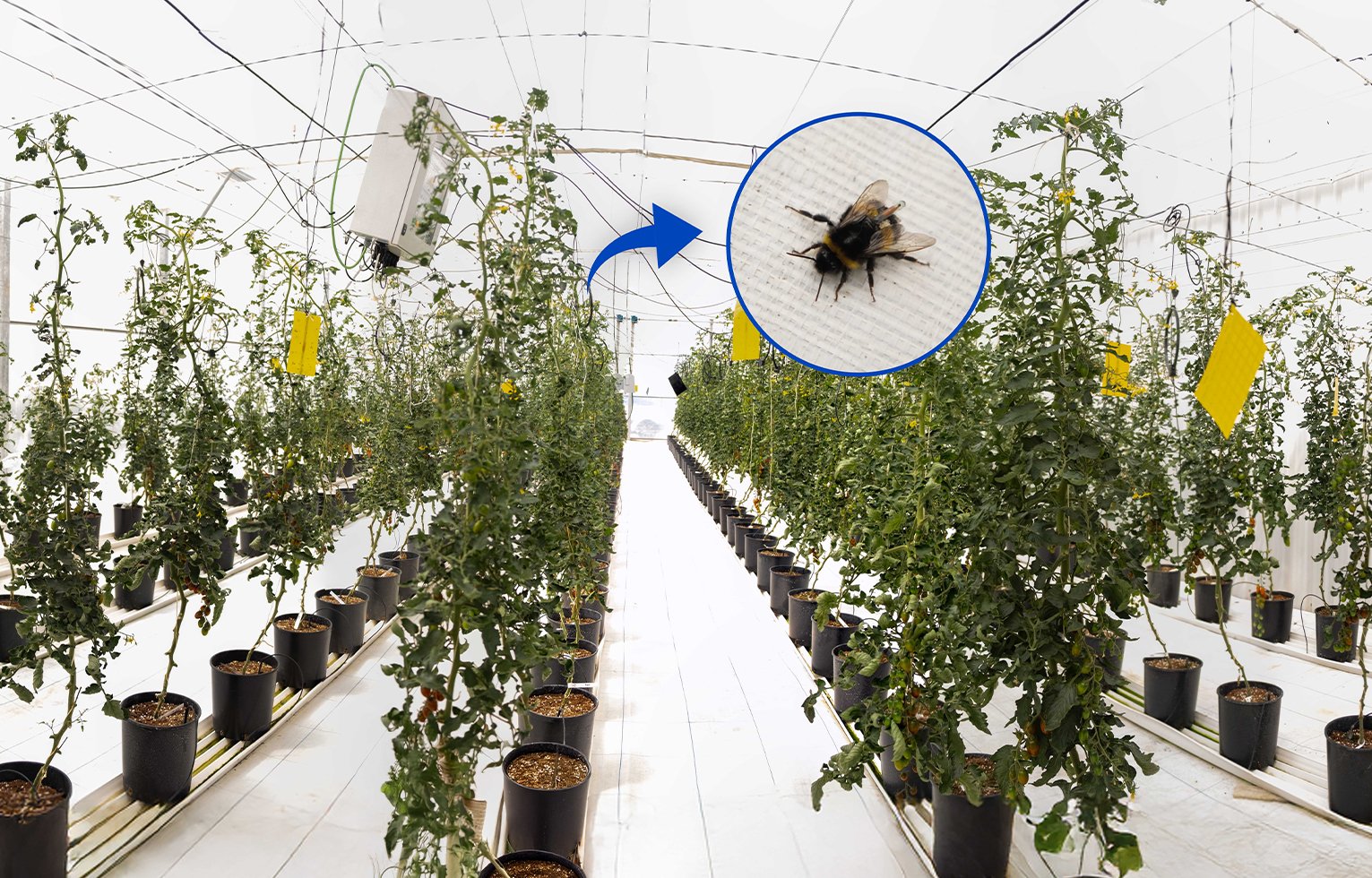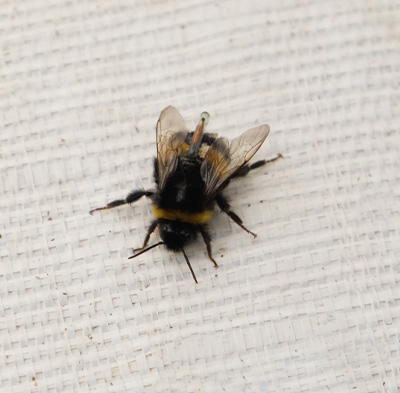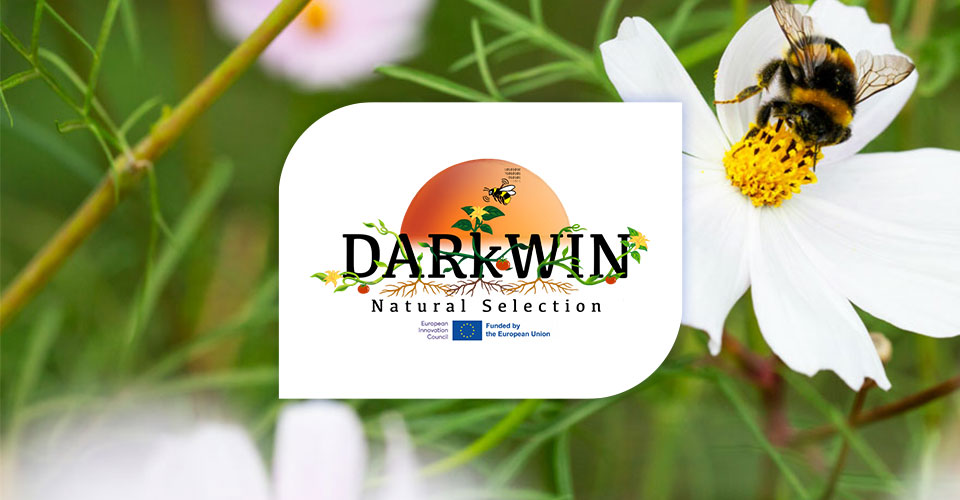DARkWIN. Project to improve crops in the face of climate change
NOVAGRIC is involved in an ambitious research project to improve crop adaptation to climate change.
The idea is to identify plant varieties that are best adapted to extreme climatic conditions and then use them as a basis for more resilient and productive crops, capable of withstanding the adverse climatic conditions that are expected in the future.
What if we let pollinators choose our next tomato varieties?
That’s the idea behind this innovative project. Instead of artificially selecting plants in a laboratory, DARkWIN proposes a different approach: letting pollinators—in this case, bumblebees—choose for us.
By visiting the flowers they find most attractive, these insects naturally select the plants with the best traits: greater heat resistance, better water-use efficiency, or superior fruit quality.
The scientific team studies this behavior to understand what pollinators prefer and how it relates to the plants’ genetics.

Project Objectives
- Develop a new geo-positioning device to automatically detect and quantify sequential spatio-temporal interactions between a large number of plants and pollinating insects.
- Develop the world’s first automated platform based on ecological ‘plant x insect’ interactions to phenotype floral metabolic traits for resistance to change for a completely new pollinator-assisted selection and breeding.
- Development of pollinator-assisted plant breeding software as a basis for a new plant breeding technique (NPBT).
- Analysis of pollinator-flower phenotyping in the prediction of agronomic resistance and crop quality.
- Establishment of a unique and unprecedented multi-omics database on nutritional, hormonal, metabolomic and transcriptomic profiling and QTLs and candidate genes.
- Modelling pollinator foraging decisions in response to environment and plant x pollinator networks.
- Develop an unprecedented set of new tomato F1 hybrids based on pollinator-driven selection of parental lines.
Technology at the service of natural selection
In the DARkWIN project, technology doesn’t replace nature—it observes and supports it.
Miniaturized sensors (Living IoT) track the flight of pollinators to understand which flowers they prefer, and each choice offers clues about the most promising plants.
But to truly understand what’s happening, it’s necessary to go beyond the flight. That’s why the team combines this data with genetic and laboratory analyses to uncover the traits shared by the plants most favored by pollinators.
All of this takes place in a phenotyping platform designed and installed by Novagric:
These are multitunnel greenhouses divided into six completely independent sectors, equipped with Climatec systems that allow different environmental conditions to be recreated in a controlled way.
Each sector has its own fertigation system and sensors that monitor variables in real time, enabling the observation of how plants behave under different climate scenarios.
Science, technology and nature are working together to unveil new ways of understanding – and improving – the agriculture of the future.

Pollinator-friendly biological control
In addition, the project incorporates biological control techniques as an alternative to chemical treatments.
In collaboration with Koppert, the use of Cryptobug has been introduced — a predatory beetle that controls mealybug populations without harming either the plants or the bumblebees.
Benefits of the project
The main application is to secure the world’s food and nutrient supply potential under adverse climatic conditions, as 75% of food crops depend on pollinators, including 84% of the species grown in the EU, generating 31% of the income from agricultural production.
By selecting the most resistant plants with the highest pollination rate, the quality and quantity of crops is improved, resulting in higher food production.
Selecting plants that are more attractive to pollinators can not only improve crop resilience, but can also help protect and promote biodiversity.
The results of this project are expected to have a positive impact on agriculture globally.
Find out all about the project
In this video report you can see how DARkWIN works from the inside: meet the researchers who make it possible and discover why this new approach to agriculture could be a game-changer in developing more sustainable and future-ready crops.
Project partners and funding
The project, which will run for the next three and a half years, is funded by the Pathfinder programme of the European Innovation Council (Horizon Europe).
The interdisciplinary consortium includes the participation of five research centres: CEBAS-CSIC, which coordinates the project; the Centro de Automática y Robótica (CAR, CSIC-UPM); the Estación Biológica de Doñana del CSIC (EBD-CSIC); the Centro de Biotecnología y Genómica de Plantas (CBGP, CSIC-UPM); and the Max Planck Institute in Germany, as well as three companies from the agri-food sector, including NOVAGRIC.
More information on the project: darkwin.eu
Categorías
Últimas novedades
- This Christmas, agriculture takes shape at Novagric
- HORT2THEFUTURE. Oxygen irrigation to improve soils
- HORT2THEFUTURE. Oxygen irrigation to improve soils
- GREENFOLD. Foldable and Reusable Greenhouses
- DARkWIN. Project to improve crops in the face of climate change
- +PreVENT. Positive pressure system for ecological greenhouses
- Novagric develops Solidarity Agricultural Projects
- Carbon Fertilisation Levels in Greenhouses
- How to control the climate during carbon fertilisation
- i-GROW. Protected crop management support systemtivos protegidos






